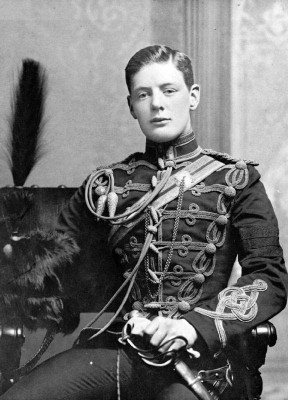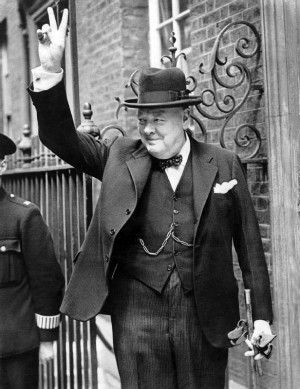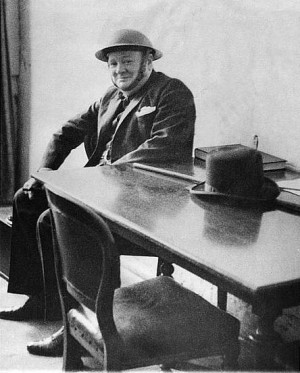 Winston Churchill was a politician in Great Britain who was born into an aristocratic family on November 30, 1874. He became the Prime Minister of Great Britain at the beginning of World War II. Churchill was also an artist, writer, historian and military officer in the army. He is viewed as a very important leader during the twentieth century. Churchill’s father was Lord Randolph Churchill, the third son of the seventh Duke of Marlborough. His father’s family also belonged to a branch of the Spencer family. Jennie Jerome was his mother, and she was a New York socialite who was born in America. Churchill was born at Blenheim Palace, in Woodstock, England.
Winston Churchill was a politician in Great Britain who was born into an aristocratic family on November 30, 1874. He became the Prime Minister of Great Britain at the beginning of World War II. Churchill was also an artist, writer, historian and military officer in the army. He is viewed as a very important leader during the twentieth century. Churchill’s father was Lord Randolph Churchill, the third son of the seventh Duke of Marlborough. His father’s family also belonged to a branch of the Spencer family. Jennie Jerome was his mother, and she was a New York socialite who was born in America. Churchill was born at Blenheim Palace, in Woodstock, England.
His Early Years
Churchill lived in Dublin, Ireland, as a young child from ages two to six. His father worked as a private secretary for his own father, who was the Lord Lieutenant of Ireland from 1876 to 1880. In 1880, his only sibling, John, was born in Ireland. Churchill attended St. George’s School from 1882 through 1884. From 1884 until the early part of 1888, he attended Misses Thompson’s Preparatory School. Here he enjoyed learning various subjects that interested him, including poetry, history, French, swimming and horseback riding.
In April of 1888, Churchill enrolled in the Harrow School, near London, which was a boarding school. He quickly became a member of the Harrow Rifle Corps, and this was considered to be the start of his military career. After Harrow, he attended the prestigious Military College at Sandhurst. It took Churchill three attempts to pass the British Royal Military College exam. When he finally passed the exam, he graduated near the top of his class.
During his school years he was not very close to his parents, rarely seeing either of them. However, he did write many letters to them during this time and some of those letters are on display at Blenheim Place. His father past away when Churchill was twenty-one years old.
Early Military Life
In 1895, Churchill he became a member of the Fourth Hussars and was sent to the northwest frontier of India and the Sudan. He saw military action at the Battle of Omdurman during 1898. During this army service, Churchill wrote many military reports for two newspapers, The Pioneer and the Daily Telegraph. He also wrote two books, the first in 1898, The Story of the Malakand Field Force and the next year, The River War. By the age of twenty-six he had authored five books.
The Boer War
 Churchill traveled to South Africa to cover the Boer War in 1899. He wrote for Great Britain’s Morning Post as a news correspondent. The Boer War was fought between the Boer Dutch and British settlers. Churchill was captured by Boer soldiers during a scouting expedition. On November 18th of that year, he and many other prisoners were sent to a prison in Pretoria. On the evening of December 12, 1899, he escaped by climbing over a prison wall.
Churchill traveled to South Africa to cover the Boer War in 1899. He wrote for Great Britain’s Morning Post as a news correspondent. The Boer War was fought between the Boer Dutch and British settlers. Churchill was captured by Boer soldiers during a scouting expedition. On November 18th of that year, he and many other prisoners were sent to a prison in Pretoria. On the evening of December 12, 1899, he escaped by climbing over a prison wall.
He traveled three hundred miles to Mozambique, a Portuguese territory, and quickly returned to Great Britain. He wrote about this experience in the book entitled, London to Ladysmith. Churchill’s escape turned him into a national hero and this was the starting point of his House of Commons career, which lasted nearly sixty years.
Early Government Career
Churchill became a Parliament member in 1900. He then served in the Conservative Party for a town in Manchester called Oldham. In 1904, Churchill quit this party because they wanted to enact protective tariffs that he was against. He also did not think that the party cared enough about social justice programs. He then became a member of the Liberal Party, and in 1908 he was elected to the Parliament.
Next, he was appointed President of the Board of Trade in the Prime Minister’s Cabinet. During this year, he married Clementine Ogilvy Hozier, the daughter of Sir Henry and Lady Blanche Hozier. Churchill and his wife had five children from 1909 to 1922.
Churchill held numerous high posts all through the first three decades of the twentieth century, for both the Conservative and Liberal governments. When he was the Liberal Home Secretary, he helped create the British welfare state. In 1911, he became the First Lord of the Admiralty.
The Admiralty and World War I
During this time, Churchill assisted in modernizing the navy and had new warships built that used oil instead of coal. In May of 1915, after the formation of new coalition government, Churchill resigned following the Battle of Gallipoli because he had proposed the unsuccessful expedition.
After that, he rejoined the army for a short time. On January 1, 1916, he was appointed Lieutenant-Colonel, and went on to commanded the Royal Scots 6th Battalion. Next, he was appointed Minister of Munitions during 1917. Churchill held that position until the end of the first World War.
From 1919 to 1922 he became the Minister of War and Air as well as the Colonial Secretary. As the Colonial Secretary, he redrew the boundaries of the Middle East. He also worked on the treaty for Ireland’s independence during these years. In 1921, his mother passed away in London.
Fall of the Liberal Party
 Churchill was temporarily out of office after the Liberal Party collapsed in 1922. In 1924, he won re-election to the Parliament as an independent. Later, he joined the Conservative Party again after Prime Minister Stanley Baldwin asked him to become the Chancellor of the Exchequer.
Churchill was temporarily out of office after the Liberal Party collapsed in 1922. In 1924, he won re-election to the Parliament as an independent. Later, he joined the Conservative Party again after Prime Minister Stanley Baldwin asked him to become the Chancellor of the Exchequer.
As Chancellor he had the country return to the more secure gold standard. When the Conservative government was not re-elected in 1929, Churchill lost this position. He then spent the next couple of years writing A History of English Speaking Peoples. From 1929 through 1939, he was denied governmental posts by all of the Prime Ministers because he disagreed with the India Bill, which was going to give self-government powers to some areas of India. He also criticized many leaders for refusing to rearm Great Britain after Adolf Hitler rose to power.
After Churchill accurately predicted that there would be war in September of 1939, he was asked by Prime Minister, Neville Chamberlain, to become the First Lord of the Admiralty again. He held this post until May of 1940, when he became the Prime Minister of Great Britain.
World War II
 Churchill was a very staunch critic of Chamberlain’s policy of appeasement towards Hitler. On September 3, 1939, Great Britain declared war on Germany, and Churchill became a War Cabinet member. He became the Chairman of the Military Coordinating Committee in April of 1940. In that same month, Germany invaded and occupied Norway. This was seen as a major setback for Chamberlain, who had opposed Churchill’s proposal to unilaterally occupy Norway’s sea ports and iron mines which would have pre-empted Germany.
Churchill was a very staunch critic of Chamberlain’s policy of appeasement towards Hitler. On September 3, 1939, Great Britain declared war on Germany, and Churchill became a War Cabinet member. He became the Chairman of the Military Coordinating Committee in April of 1940. In that same month, Germany invaded and occupied Norway. This was seen as a major setback for Chamberlain, who had opposed Churchill’s proposal to unilaterally occupy Norway’s sea ports and iron mines which would have pre-empted Germany.
Parliament held a debate concerning the crisis in Norway which resulted in a no confidence vote against Chamberlain. Churchill was then appointed the Prime Minister of Great Britain on May 10, 1940, by King George VI. He was also given the position of Defense Minister of Great Britain. This made Churchill the most powerful Prime Minister in Great Britain’s history. Within hours of these appointments, Germany invaded Belgium, Luxembourg and the Netherlands. Two days later, the German Army entered France. This meant that Great Britain was fighting Germany on their own.
Immediately, Churchill developed a coalition cabinet that consisted of leaders from the Conservative, Labor, and Liberal parties. At the House of Commons, on June 18, 1940, he gave one of his most famous speeches. He spoke about “the Battle of Britain” that was soon to start. Churchill came up with the basis for a coalition with the U.S. and the Soviet Union. Since Churchill already had a good relationship with President Franklin D. Roosevelt, he was able to secure important United States aid by March of 1941 with the Lend Lease Act. This permitted Great Britain to acquire military goods from America on credit.
Churchill became very confident that the allies would win World War II after the U.S. entered the war in December of 1941. In the following months, he worked very closely with the powerful leader of the Soviet Union, Joseph Stalin, and President Roosevelt to build what he called the “Grand Alliance.” He traveled thousands of miles to places such as Teheran in 1943, and Yalta in February in 1945, to meet with these leaders.
In 1945, Churchill helped redraw the map of Europe after Germany started losing the war. With World War II winding down, he proposed many new social reforms for Great Britain, but was not able to win the public’s approval. Churchill was defeated in the general elections that were held in July of 1945.
After the war ended, he recognized that a new threat had taken Adolf Hitler’s place. In 1946, he gave another one of his famous speeches in Fulton, Missouri. There, he warned Western nations about the Soviet Union’s “Iron Curtain” and how it could affect liberty in Europe and across the world. Over the next couple of years, he was one of the leaders of the Opposition Party and still had an important influence on international affairs.
Once Again Prime Minister
Churchill went back to work for the government after Great Britain’s general election in 1951. He once again became the Prime Minister of Great Britain in October of 1951, and held the position until he resigned in April of 1955. During these years, he introduced many domestic reforms but they were overshadowed by several foreign policy crises in two of Great Britain’s colonies, Malaya and Kenya. He ordered military action which successfully stopped the rebellions, but by this time, it was very clear the country could not sustain its colonial powers.
Health
Churchill had begun to show signs of poor health in 1941 when he visited President Roosevelt at the White House. During that time, he experienced a mild heart attack. In 1943, he suffered another heart attack when he had pneumonia. In June of 1953, at the age of seventy-eight, he suffered several strokes at his office on Downing Street.
The news was not given to Parliament or the public, instead it was announced that he was experiencing exhaustion. Churchill was able to recuperate at home and then returned to work in October. By this time it was very evident that he was mentally and physically slowing down. In April of 1955, he retired as Great Britain’s Prime Minister. Churchill also suffered another stroke in December of 1956. He remained with the Parliament for several more years but did not seek re-election in 1964.
Retirement Years and Death
He was a very accomplished artist and enjoyed painting impressionist landscapes, mostly oil-based. He continued painting during his retirement years. Some of his paintings are on display in a museum in Texas. Another one of his hobbies was breeding butterflies.
In spite of his bad health, Churchill still had a very active public life, although it was mainly from his homes at Hyde Park Gate, in London and in Kent. On January 15, 1965, he experienced a very severe stroke which left him critically ill. Nine days later, on January 24th, Sir Winston Leonard Spencer-Churchill died when he was ninety years old at his home in London. Great Britain mourned his death for over a week.
Funeral
Churchill’s coffin was taken to the beautiful Palace of Westminster for three days for public viewing by the decree Queen Elizabeth II. The state memorial service took place at the historical St Paul’s Cathedral. He was given a nineteen gun salute by the Royal Artillery, and the Royal Air Force gave him a fly-by salute.
His state funeral was the largest one ever held at that time. Over one hundred representatives from various nations around the world attended the funeral service. Over three hundred and fifty million people watched the service which included twenty-five million people in Great Britain. At his request, Churchill was buried in his family plot at Saint Martin’s Church in Bladon, near his Blenheim Palace birthplace. His wife died in December of 1977, when she was ninety-two years old, and she was buried next to him.
Honors and Awards
During his lifetime, Churchill receive many awards and honors. In 1953, he was knighted by Queen Elizabeth. In 1963, he was made an Honorary Citizen of the United States of America by President John F. Kennedy. He received the Nobel Prize in Literature when he was Prime Minister of Great Britain. Today, Winston Churchill is still considered by many to be one of the most influential individuals in British history.
